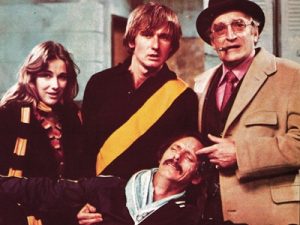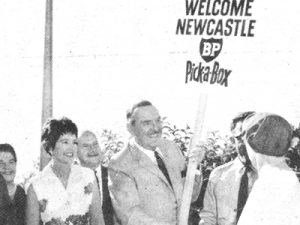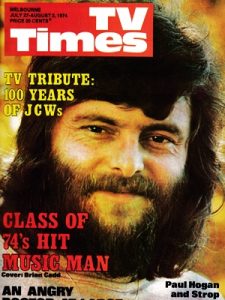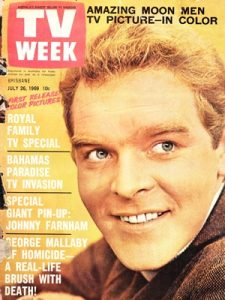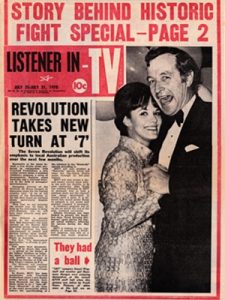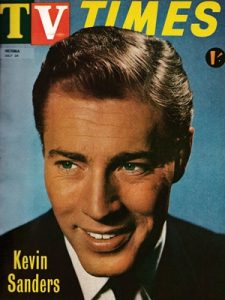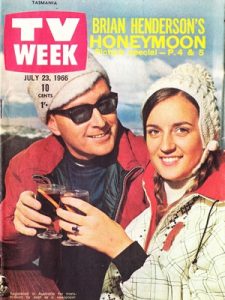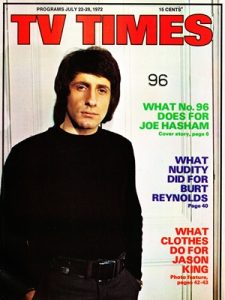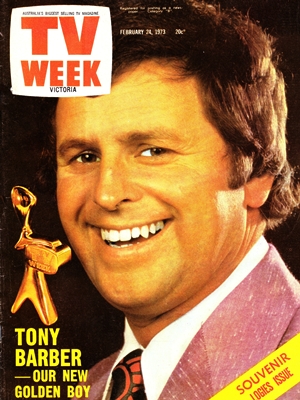
Quiz show host Tony Barber was awarded the Gold Logie at the 15th annual TV Week Logie Awards, held at the Southern Cross Hotel, Melbourne, on 16 February 1973 and televised on the Nine Network.
Bert Newton again hosted the presentation, with overseas guests Glenn Ford (Cade’s County), Loretta Swit (MASH), Gail Fisher (Mannix) and Michael Cole (Mod Squad).
It was to be a Logie Awards marked by controversy — both on and off-air. Mod Squad actor Cole, who appeared at the awards in 1971 without incident, created one of the Logies’ most infamous moments on stage by slurring his acceptance of Mod Squad‘s award for Best American Show and then blurting “oh, shit!” to a audibly stunned crowd and visibly distracted host Newton. In 2023 such a word would barely cause a ripple but in 1973 it was shattering. TV Week went as far as publishing an apology afterwards:
| “Michael Cole’s use of a four-letter word on the telecast was unfortunate and we apologise to our readers and the many thousands of people who saw the live Logies telecast.” |
Earlier in the evening, Cole had been called by Newton to the stage. Suddenly, Cole was nowhere to be found, with Newton adlibbing while the actor was hurriedly rushed to stage from the men’s room. A clearly ’emotional’ Cole gave a somewhat confused speech after Newton’s introduction.
In commemorating the 21st anniversary of the TV Week Logie Awards in 1979, former TV Week Sydney editor and Logies organiser Jerry Fetherston recalled that Cole followed up the infamous Logies night with a day of interviews to the press to apologise to the people of Australia for what he’d said and admitted that he’d had too much to drink.
YouTube: diabolik68
Hollywood actor Ford played his part on-air without incident but caused a stir off-air. It was reported that Ford, a US Replican, refused to shake hands with the Australian Minister for Media, Senator Doug McClelland, at the awards. Ford was reported to have said to the Minister: “I don’t like what your Government is saying about my country and the way it is trying to put American actors out of work.” Ford’s comments made it to the US press. He later denied that he had refused the shake the minister’s hand, but as Fetherston recalled later, Ford only agreed to be cordial and shake hands with the minister after being reminded that the awards were a non-political event and were to recognise Australian television.
The US Ambassador to Australia, Walter Rice, responded that some of the press reports around the Ford incident were exaggerated and put out a statement: “They both agreed to disagree on political matters but now have common understanding of each other’s point of view. As a result of the discussions nothing but good and close relations between the US and Australia could come out of it.”
Ford was also alleged to have refused to sit next to African-American actress Fisher at the awards. Ford dismissed the incident as a misunderstanding: “I wanted to sit next to people I knew, such as my son. I have the utmost respect for Miss Fisher as an artist. She must have misunderstood and I am surprised that she would.”
The conduct of both Ford and Cole attracted mixed reaction from TV Week readers:
- Tom Jeffrey, chairman of the Australian Film Industry Action Committee wrote: “Thanks Glenn Ford for your outburst about our Government saying nasty things about your Government and preventing US actors working here. It allowed Doug McClelland to react like the true Australian he is along with the rest of us. Put your foot in it some more Glenn you will make a nation out of us yet. We suggest to the Logie Awards committee that they make a start by not inviting any more four-letter-word prejudiced overseas stars to present our awards and instead ask an eminent Australian to do it.”
- A Western Australia reader wrote: “I see that Mr Glenn Ford refused to sit next to the American actress Gail Fisher. Well, you can tell Mr Ford from me, that if I ever get the chance to sit next to Miss Fisher I’ll do it, as in my book she is tops.”
- From a Melbourne reader: “I am writing mainly about a great star, Michael Cole. Even though I was disappointed in his behaviour, I do not think it was completely necessary for everyone to make a fuss because of the four-letter word he used. At least he was and still is, a gentleman, because not many people apologise and suffer the humiliation that he went through.”
- A group of female office workers wrote: “We just had to tell you how disappointed we all were with the Logie Awards. We all know that you must have drink at these occasions, but it unfortunately spoils it for people who are watching the show.”
- Another Melbourne reader wrote: “Mr Ford is a proud American citizen who believes in a democracy — the sort of man Australia needs — a man who can back his opinion with a record of service to his country and our country, Australia. I can understand Mr Ford’s attitude to Senator McClelland. Miss Fisher should be told that Mr Ford was one of the first Americans to be honoured for the advancement of coloured people.”
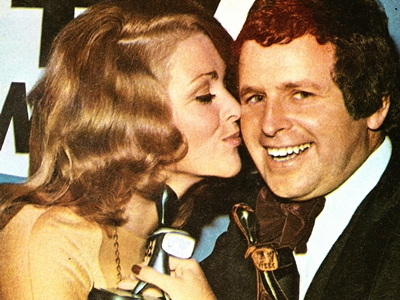
Tony Barber’s Gold Logie win came after The Great Temptation had expanded to from two to five nights a week and won the Logie for Most Popular Program In NSW. Barber also won the Logie for Most Popular Male Personality In NSW and his co-star Barbara Rogers, won Most Popular Female Personality In NSW.
It was also a big night for Number 96. The top-rating series collected the Logie for Best New Drama, while Pat McDonald, who played busybody “conserge” Dorrie Evans, won Best Actress. Sadly, Number 96‘s wins came just a month after the death of the show’s co-producer Don Cash.
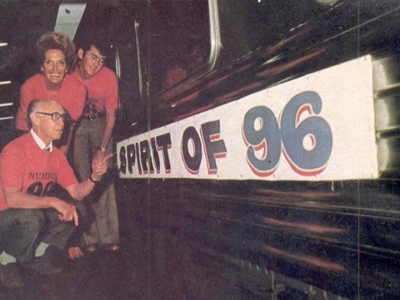
When Logies organisers had invited four cast members from Number 96 to attend the Logies, the show’s publicist Tom Greer protested that Number 96 was an ensemble cast and insisted that all 16 cast members be invited to attend. The award organisers agreed. Greer then arranged for a train, dubbed “The Spirit Of 96”, to bring the cast down from Sydney for the awards. The overnight train made stops at towns along the route, allowing fans to get up close to the cast in person. Upon arrival at Spencer Street station in Melbourne’s CBD, the cast were met with crowd numbers not seen in Melbourne since The Beatles had visited a decade earlier.
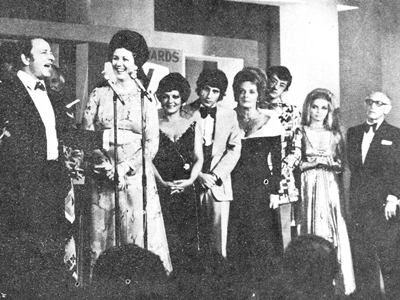
Veteran police drama Homicide won the Logie for Best Australian Drama, and Division 4 star Gerard Kennedy, who had won Gold the previous two years, won Best Actor.
A Current Affair won Best Public Affairs Program, while ABC reporter Caroline Jones won the Logie for Outstanding Contribution To TV Journalism for her two-part report into poverty for This Day Tonight. ABC producer John Power won the award for Outstanding Creative Effort for his documentary Like A Summer Storm, depicting the life of Australian politican Dr Herbert Vere Evatt. The documentary not only featured retrieved home movie footage taken by Evatt himself, but also presented dramatic re-enactments of scenes from Evatt’s life. Power, an 11-year veteran at ABC, felt that the new style of documentary would pave the way for future similar ventures. “The audience is far more likely to watch a dramatic historic document than a straightforward pictorial list of facts,” he told TV Week.
TCN9 reporter Greg Grainger won the Logie for his coverage of Sydney’s George Street bombings. The dramatic on-the-spot report as Grainger was interviewing witnesses of the bombing of a travel agency on George Street was interrupted by another bomb blast just streets away. His camera crew continued to film as Grainger made his way from one bomb site to the other, giving detailed commentary.
Pop star Johnny Farnham won his fifth consecutive Logie award for Best Teenage Personality. And perhaps as indicative of the changing programming trends, there was no Logie award category for best variety or musical show, although Newton did win a Logie for Best Compere.
Children’s TV producer Godfrey Philipp received a special Logie for Outstanding Contribution to Children’s Television, ironically just after ABC had put the axe to his popular long-running series Adventure Island. He created the show in 1967 after his previous series, the award-winning The Magic Circle Club, was axed by ATV0, Melbourne.
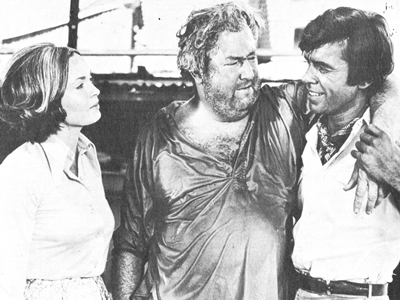
An episode of the detective series Boney won two Logies. James Laurenson, the New Zealand-born actor who played the lead character, part-Aboriginal Detective Inspector Napoleon “Boney” Bonaparte, won the Logie for Best Single Performance By An Actor for his performance in the episode Boney Meets The Daybreak Killer. Scriptwriter Frank Hardy won the Logie for Best Scriptwriter for the same episode.
Sydney actress Anna Volska won Best Single Performance By An Actress for her portrayal of cosmetics queen Helena Rubenstein in the ABC series Behind The Legend. Volska was also a cast member of the Nine Network comedy series The Godfathers, which won the Logie for Best Australian Comedy.
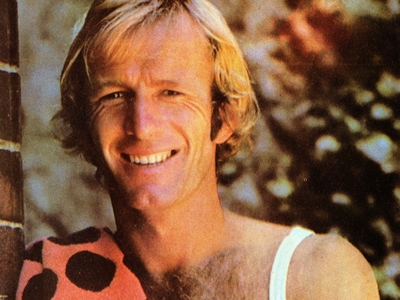
The George Wallace Memorial Logie for Best New Talent was awarded to Paul Hogan. The former Sydney Harbour Bridge rigger first reached fame as a contestant on New Faces in 1971. He was then signed up by Mike Willesee to appear as a social commentator on Nine’s A Current Affair. This led to him appearing in a commercial for Winfield cigarettes, which also won a Logie for Best Commercial.
Following his Logie win, Hogan went on to a series of comedy specials for the Seven Network, before heading back to the Nine Network in 1976.
Producer Rod Kinnear‘s documentary Jane Cooper — Hermit Girl, which told of the Melbourne 18-year-old who went to live a life of solitude in the wilderness of the remote De Witt Island, was awarded Best Documentary, and wildlife series Shell’s Australia won Best Documentary Series.
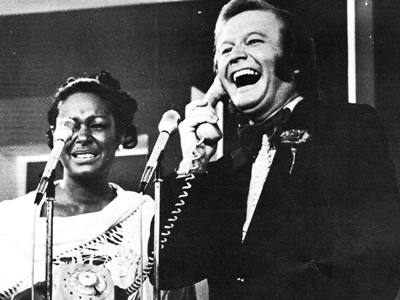
National Awards:
Gold Logie — Best Australian Personality Of The Year: Tony Barber
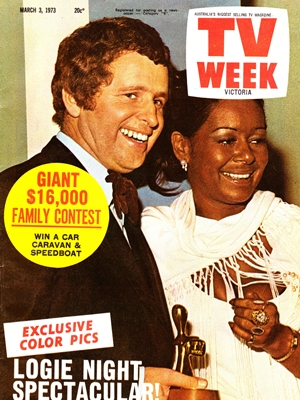
Best Actor: Gerard Kennedy (Division 4)
Best Actress: Pat McDonald (Number 96)
Best Teenage Personality: Johnny Farnham
Best Australian Drama: Homicide
Best New Australian Drama: Number 96
Best Australian Comedy: The Godfathers
George Wallace Award For Best New Talent: Paul Hogan
Best Australian Commercial: Winfield
Best American Show: Mod Squad
Best British Show: On The Buses
Best Australian Compere: Bert Newton
Best Public Affairs Program: A Current Affair
Best Documentary: Jane Cooper — Hermit Girl
Best Documentary Series: Shell’s Australia
Special Award — Best Scriptwriter: Frank Hardy
Special Award — Best Single Performance By An Actor: James Laurenson (Boney)
Special Award — Best Single Performance By An Actress: Anna Volska (Behind The Legend)
Special Award — Outstanding Contribution To TV Journalism: Caroline Jones (This Day Tonight)
Special Award — Outstanding Creative Effort: Like A Summer Storm (ABC)
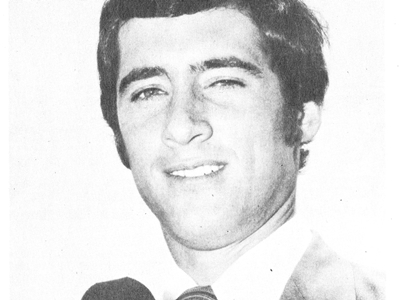
Special Award — Best News Coverage: Greg Grainger (TCN9, Sydney)
Special Award — Contribution To Children’s TV: Godfrey Philipp
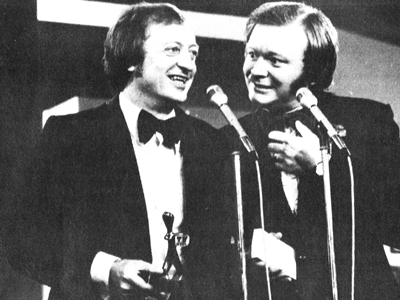
State-based awards (Best Male Personality, Best Female Personality, Best Show):
NSW: Tony Barber, Barbara Rogers, Great Temptation
VIC: Graham Kennedy, Mary Hardy, The Graham Kennedy Show
QLD: Ron Cadee, Dina Heslop, I’ve Got A Secret
SA: Ernie Sigley, Anne Wills, Adelaide Tonight
WA: Jeff Newman, Sandy Palmer, Anything Goes
TAS: Graham Smith, Sue Gray, Smith’s Weekly
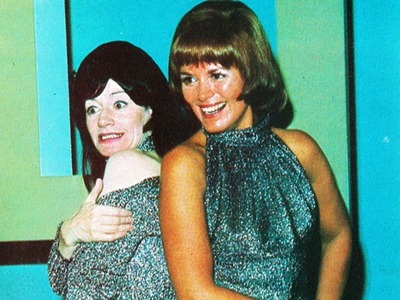
The 63rd annual TV Week Logie Awards, Sunday 30 July, 7.30pm (Red Carpet 7.00pm), Seven and 7Plus.
Source: The Canberra Times, 19 February 1973. TV Week, 24 February 1973, 3 March 1973. Number 96: Australia’s Most Notorius Address, Nigel Giles, Melbourne Books. 21 Years Of Logies, Southdown Press. GraingerTV
